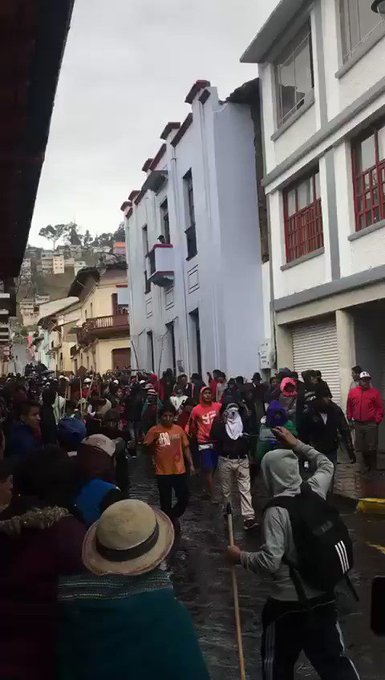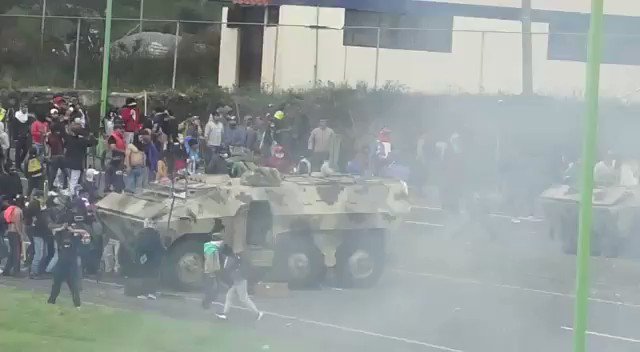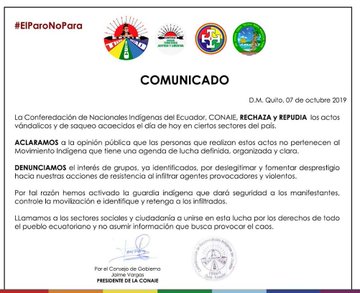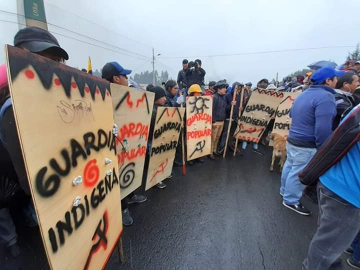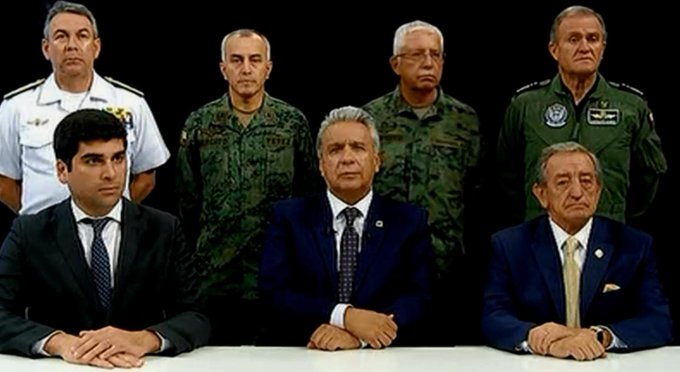Guaranda, Bolívar. Policías custodiados por campesinos y obreros como parte del levantamiento popular contra el paquetazo de Lenín Moreno #EcuadorSeLevanta
In other towns, the police and the army have withdrawn, unable to lift the roadblocks. There are images of police sent to repress the movement that have ended up escorting the indigenous-peasant columns that are advancing to converge in the capital Quito. Some rank-and-file soldiers must sympathise with the protests of their brothers, wives and mothers. Others will have decided that there was no point in being attacked to defend this government. These are still isolated cases, but they are nevertheless very significant.
#EcuadorSeLevanta 7 octubre
Todo auténtico proceso revolucionario tiende a romper el aparato del estado en líneas de clase. Ante el avance del levantamiento obrero-campesino el estado responde con represión, pero en ocasiones se rompe su disciplina.On Sunday night, Lenín Moreno called for dialogue with "our indigenous brothers", using a very different tone from the one he used when declaring the state of emergency on Thursday night. Then, he talked about the fact that the measures were not negotiable and threatened the protesters that "there would be consequences" for their actions. “Violence and chaos will not win. I will not back down because the right thing has no nuances,” he said. Now, overwhelmed by events, he was forced to offer a "sincere dialogue." Too late. The slogan of the movement at the beginning was "either the package falls, or the government falls", now it is a matter of bringing down the government in order to bring down the package.
Monday started with the government paralysed and losing control of the situation. At dawn, armoured vehicles transported troops with red berets to protect the presidential palace. CONAIE leader Jaime Vargas responded to the offer of negotiations, saying that they had cut off the dialogue with the repressive government, and that they were heading to the capital. Indigenous columns across the country were already marching to Quito and nothing could stop them. In all the access roads to Quito, there were battles and clashes between protesters on one side and the police and army on the other. They could not stop the people on the move:
Quito, 7 de octubre, momento en que las columnas indígenas rompen uno de los bloqueos policiales. El estado de excepción no detiene el levantamiento obrero-campesino contra el paquetazo de #ChaoLeninChao #HuelgaNacional
At one of the entrances to the city, protesters set fire to one of the armoured vehicles:
#ParoNacionalEC manifestantes queman un vehículo blindado del ejército que impedía el paso a la capital Quito - avanza la insurrección contra el paquetazo del FMI que anunció Moreno
In recent days, there was looting in several cities, and during Monday's demonstrations in the capital there were acts of vandalism. CONAIE responded that these were the work of infiltrating provocateurs, and that they were going to use the indigenous guard to protect the demonstrations.
Ecuador, 7 ed octubre. La @CONAIE_Ecuador activa la guardia indígena para proteger las mnifestaciones y prevenir la acción de provocadores violentos. #ParoNacionalEC #EcuadorSeLevanta
The worker-peasant columns in the capital were breaking all the barriers in their path and advancing towards Carondelet's palace, which was militarised. A group of protesters tried to take over the National Assembly building. Finally, the government had to suspend the announced press conference and evacuate journalists from the presidential palace. In a televised address, flanked by the vice-president, defence minister and army generals, Lenín Moreno announced that he was moving the government headquarters to Guayaquil. The executive power fled in terror at the offensive of workers, peasants and students, and was forced to leave the capital of the country!
#Atención Presidente Lenín Moreno anuncia, en cadena nacional, que la sede de Gobierno la trasladó a Guayaquil ante las protestas.
In his speech, Lenín Moreno used the old trick of trying to discredit the protest by saying that it was a plot by Venezuelan president Maduro and former Ecuadorean president Correa. A doubly ridiculous statement, because obviously it was the IMF and Moreno himself who designed the anti-popular adjustment package, and on the other hand the main organisations involved in the mobilisation have long been opposed to Correa. Moreno's accusations are a last, desperate attempt to take away legitimacy from the protest. In fact, the October package has only been the spark that has ignited a national uprising, the fuel for which had been accumulating during two years of attacks and anti-worker measures by the Moreno government.
Build the movement! Bring down the government!
The movement has taken important steps forward. Much of the country is paralysed by roadblocks. The indigenous people have gone from blocking routes to marching to Quito. The power of the state has been partially challenged. The uprising has forced the government to flee the capital. The National Assembly has suspended its sessions. However, victory has not been achieved yet. The government is still in power, the package has not been withdrawn.
CONAIE has declared a Peoples' Assembly in Quito; and for tomorrow, a coalition of workers', peasants' and students' organisations has called a general strike throughout the country.
Workers, peasants and students must build united organs of power and struggle / Image: public domain
On the other side, the oligarchy and imperialism are regrouping their forces. Guayaquil Mayor Nebot, who at first hypocritically criticised Moreno's measures, has today called “for unity to defend democracy, peace, freedom, cities, families and property." What Nebot, a representative of the rancid Ecuadorian oligarchy and leader of the bourgeois Christian Social Party, is interested in defending - under the mantle of "democracy" and "peace" - is above all "property", that is, bourgeois property. The US has also run to support its Ecuadorian puppet with a statement denouncing "violence as a form of protest." The press of the oligarchy lies and manipulates about the character of the movement.
The movement advances and acquires strength. There are already insurrectional elements in the situation: detention of police and military personnel by the protesters, breaking the blockades of the army and the police, the setting up of a peasant guard, the flight of the government of the capital, the formation of the Peoples' Assembly and so on. It is necessary to strengthen and spread these elements. Workers' organisations, peasants and students must form a united leadership for the struggle. The People's Assembly must be expanded, with elected and recallable delegates from factories, communities, universities and secondary schools, so that it becomes an organ of struggle and power. The indigenous guard must be extended, with the setting up of worker and peasant self-defence organisations to defend the mobilisations.
The peasant-worker alliance in Ecuador in the past has brought down at least two governments that applied austerity packages: that of Bucarám in 1997 and of Mahuad in 2000. The potential to repeat that outcome is implicit in the situation. However, it is also important to learn from the lessons of those events. In both cases the revolutionary movement of the masses overthrew the bourgeois government, but failed to take power in their own hands. As a result, another bourgeois government took power, and when the mass movement had receded, it applied the same policies against working people.
The conclusion to be drawn is as follows: it is necessary to bring down the government of Lenín Moreno in order to overthrow his package. But that’s not enough. The package is not the result of "pure corruption and ineptitude" as Correa says. It is the result of the impact of the crisis of capitalism in Ecuador: whose economy is subjugated to imperialism and export-based. Workers and peasants must take power in their own hands, so that the country's resources are used for the benefit of the majority. It is not enough to bring down the government, it is necessary to wrest political power from the pro-imperialist oligarchy and expropriate its economic power.
Prev [중동/이라크] Iraq protests: All the latest updates[중동/이라크] Iraq protests: All the latest updates 2019.10.10by 볼셰비키 [미국/GM파업] Behind the GM strike: Wall Street wants temps for hi-tech vehicles and the UAW agrees Next [미국/GM파업] Behind the GM strike: Wall Street wants temps for hi-tech vehicles and the UAW agrees 2019.10.06by 볼셰비키
Articles
- [프랑스] France: biggest strike in decades signals new era of class struggle
- [이라크] “We Do Not Want These Criminals to Rule Us”
[볼리비아] Bolivia: How Anez Nullified 13 Years of Morales Govt's Achievements in...
[제국주의/미국] From 1945 Until Today – 20 to 30 Million People Killed by the USA
[미국/ 선거/ 정권교체] CIA Has Interfered With Over 81 Foreign Elections in the P...
[시리아/미국] ‘I Like Oil, We’re Keeping the Oil’: Trump Confirms US Wants Syria’...
- [홍콩/칠레/제국주의 미디어] Why is the Media Covering Protests in Hong Kong, Chil...
[독일/미국] Bundestag Lawmakers Want US Troops, Nukes Out of Germany
[세계정세] From Chile to Lebanon: Working class offensive sweeps the globe
[미국/국방비] Military Spending’s Out of Control While Slashing It Could Easily F...
[미국/ISIS] The Democrats Helped Cultivate the Barbarism of ISIS
[중동/IG] Defend the Kurds! Drive Out U.S./NATO Imperialists!
[푸에르토리코/번역] 푸에르토리코 –지배집단 타도를 위한 투쟁은 계속된다!2
[중동/이라크] Iraq protests: All the latest updates
[에콰도르] Ecuador: worker-peasant uprising – the government flees the capital

